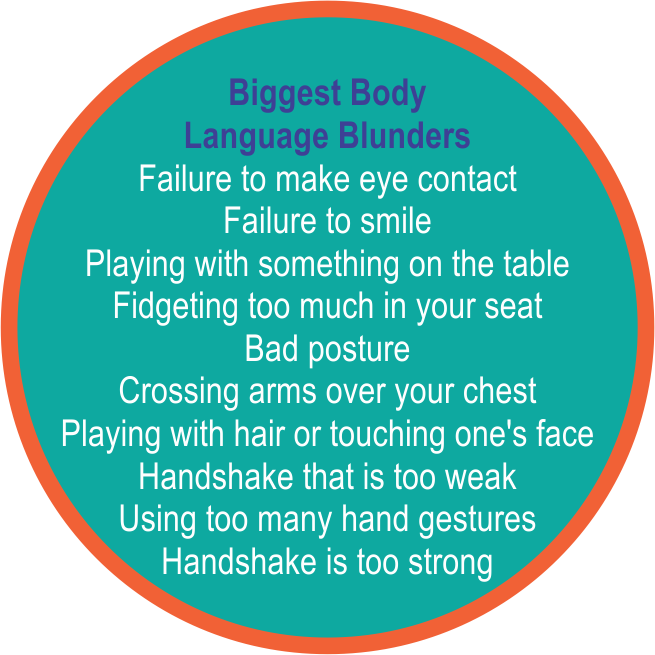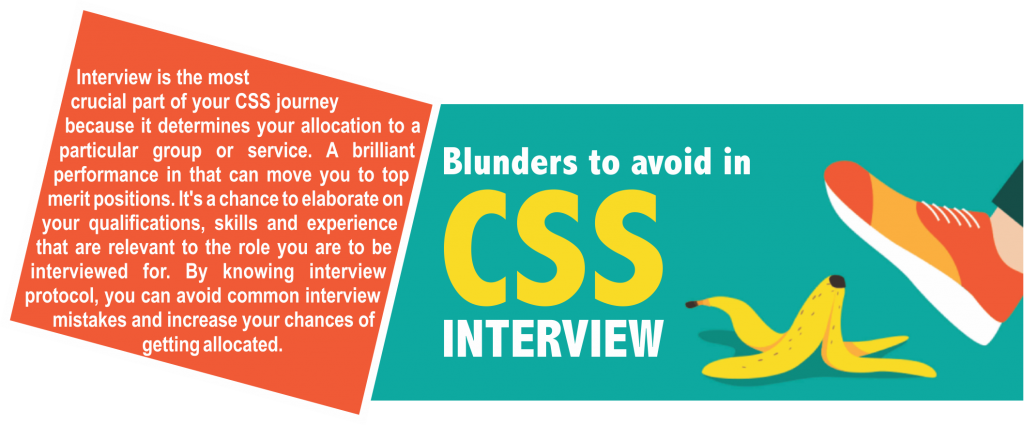Blunders to avoid in
CSS INTERVIEW
Common interview slip-ups
It is easy to fall into a defeated mental place when making an easily avoidable interview mistake, which can be a hard state of mind to turn around. Here are common mistakes candidates make during the interview and what you should do instead:
1. Arriving late or too early
2. Inappropriate attire
3. Using cellphone
4. Losing focus
5. Talking too much
6. Not preparing for common questions
7. Focusing too much on yourself
8. Poor body language
 1. Arriving late or too early
1. Arriving late or too early
It is very important to arrive at your interview place on time or slightly early. Arriving on time shows the interviewer panel that you are punctual and value their time.
2. Inappropriate attire
Always look professional for your interview. Wearing formal official attire shows that you are serious about this role and have a sense of professionalism. Feel confident about your outfit and it should be ironed well.
3. Using cellphone
Rather than looking at your cellphone in the waiting room, read over your profile to prepare for your interview. Before meeting the interviewers, make sure your phone is turned off. This can help you stay focused and free of distractions during the interview.
4. Losing focus
Make sure to get enough sleep and eat a nutritious meal before your interview. It’s important that you appear refreshed and focused during the interview. Make sure to listen to everything the interviewer says so you can answer well and up to the panellists’ satisfaction. Make an effort to appear enthusiastic about the position. Use active listening skills to show that you are interested in what the interviewer is saying.
5. Talking too much
Practice answering interview questions briefly. Only include information that is relevant to the question the interviewer has asked and the role you’re being interviewed for. Try to keep talking about your personal life to a minimum and keep the conversation professional. Give the interviewer a chance to talk as well, and use non-verbal cues such as nodding and eye contact to show them that you are listening.
6. Not preparing for common questions
Before your interview, search for common and general questions asked during CSS interviews in previous years. Prepare answers for all those questions. Having responses in mind can help you appear more confident and qualified. Practice your responses by asking a member of your family or a friend to do a mock interview with you.
7. Focusing too much on yourself
Rather than solely focusing on how this role can benefit you, think of the value and service that you can add to the civil service and to the entire nation. This shows that you are committed to the mission and goals of civil service.
8. Poor body language
When you walk into the interview room, greet the panellists with a smile. If one or more panellists want a handshake; do it firmly while making an eye contact. Say Salam and say it’s very nice to see you. Then, once you sit down, make sure you are sitting up straight in your chair. Practice keeping a good spine posture before your interview. Make sure to keep regular eye contact with the panellists throughout the interview and smile to show your enthusiasm about the job. As the interviewer speaks, use head nodding and other cues to show you’re listening.
These points will help you carry the day in your CSS interview.
 “Always focus on the outcome you want to achieve in a meeting, interview or negotiation rather than how you think you’re doing and what you think people will think of you.” — Steal the Show (page 36)
“Always focus on the outcome you want to achieve in a meeting, interview or negotiation rather than how you think you’re doing and what you think people will think of you.” — Steal the Show (page 36)
Lesson One: Everybody is a performer
Your favourite movie characters are seasoned performers with years of experience behind them. They take on different roles and interpret them to award-winning standards. On Monday morning, you show up to work in your buttoned-up shirt, and you take on the role of office Steve. You leave work, and you have to become “Road-Rage Steve.” By the time you get home, you are a loving father. This does not make you fake or a pretender. Every situation demands a different version of your personality, and you have to give your best performance to excel at it.
Lesson Two: Improvisation is the actor’s greatest tool
“Finding your voice is important for your results. If you want to play different roles authentically, and amplify or downplay different parts of your personality to do so, it’s important to be comfortable with who you really are and what you stand for so you never lose sight of your values.” — Steal the Show (page 5)
A familiar scene is two people arguing, waiting for the other to keep quiet to chip in their own rehearsed response. This is a frustrating vicious cycle where nobody wins, and the argument does not get resolved either. A more productive approach would be to listen with all your senses. Watch for the reaction and cues from your audience, and you can give an appropriate response.
This is one of the first lessons that actors learn. Actors don’t manufacture emotions out of thin air; they react based on the stimuli they receive from their co-stars.
Improvisation is synonymous with adaptability. The CEO of a multimillion, multinational enterprise will have to switch swiftly between roles and interact appropriately with different people with different value systems.
That is the way of successful people.
Lesson Three: Importance of unlocking your inner voice
Playing a role, however, does not mean that you have to be pretentious or insufferable. This is real life, and your experiences, values and beliefs form part of who you are. They also help you become more relatable and authentic to your audience. People like Robin Roberts and Sheryl Sandberg are typical examples of how your inner voice can help you sway the audience into your corner.
Put into Action
1. Listen with all your senses.
2. Fake it until you make it.
3. Let your inner voice out.
4. A good performance is better than a perfect one.
5. Develop great listening skills.
6. Learn from the best and practice.
7. Improve your speaking by using pauses.
This is a great book for anyone looking to hit the bull’s eye and carry the day in life with the flying colors.
“Showing empathy for the audience means I’m paying attention to how they are listening and what they are feeling.”- Steal the Show
The author has a special interest in
personality development.
 Jahangir's World Times First Comprehensive Magazine for students/teachers of competitive exams and general readers as well.
Jahangir's World Times First Comprehensive Magazine for students/teachers of competitive exams and general readers as well.



